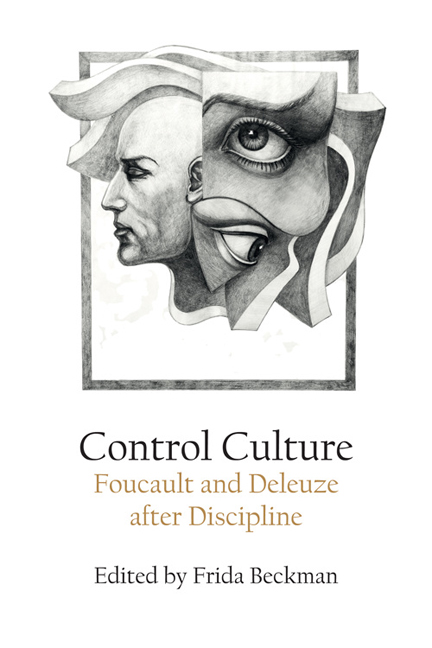Book contents
- Frontmatter
- Contents
- Acknowledgements
- Notes on Contributors
- Introduction. Control of What?
- 1 Notes from an Investigation of ‘Control Society’
- 2 Post-Mortem on Race and Control
- 3 Periodising (with) Control
- 4 Subjects of Sovereign Control and the Art of Critique in the Early Modern Period
- 5 Posthumanism, Social Complexity and the Political: A Genealogy for Foucault’s The Birth of Biopolitics
- 6 ‘That Path is for Your Steps Alone’: Popular Music, Neoliberalism and Biopolitics
- 7 Cinema in the Age of Control
- 8 Towards a ‘Minor’ Fascism: Panoptic Control and Resistant Multiplicity in TV’s Spooks
- 9 Species States: Animal Control in Phil Klay’s ‘Redeployment’
- 10 Control and a Minor Literature
- 11 Philosophy and Control
- Index
11 - Philosophy and Control
Published online by Cambridge University Press: 05 May 2021
- Frontmatter
- Contents
- Acknowledgements
- Notes on Contributors
- Introduction. Control of What?
- 1 Notes from an Investigation of ‘Control Society’
- 2 Post-Mortem on Race and Control
- 3 Periodising (with) Control
- 4 Subjects of Sovereign Control and the Art of Critique in the Early Modern Period
- 5 Posthumanism, Social Complexity and the Political: A Genealogy for Foucault’s The Birth of Biopolitics
- 6 ‘That Path is for Your Steps Alone’: Popular Music, Neoliberalism and Biopolitics
- 7 Cinema in the Age of Control
- 8 Towards a ‘Minor’ Fascism: Panoptic Control and Resistant Multiplicity in TV’s Spooks
- 9 Species States: Animal Control in Phil Klay’s ‘Redeployment’
- 10 Control and a Minor Literature
- 11 Philosophy and Control
- Index
Summary
Deleuze's ‘Postscript on Control Societies’ is one of his most influential essays. As noted in the Introduction to this volume, it was published in French in L’autre journal, before it appeared alongside the ‘Control and Becoming’ interview with Antonio Negri in Deleuze's Pourparlers (see Introduction, p. 1). It first appeared in English in October in 1992 before the translation of Negotiations in 1995 (Deleuze 1995a: 169–76). Both English versions have been widely cited. The influence of this short essay is further amplified by references to it in highly cited works such as those by Nikolas Rose, Michael Hardt and Antonio Negri (Rose 1999: 233–5; Hardt and Negri 2000: 22–3).
Deleuze's ‘Postscript’ is also one of his more enigmatic essays, giving rise to a variety of interpretations of what exactly is meant by control, along with multiple and sometimes conflicting accounts of its relationship to Foucault's concepts of disciplinary, biopolitical and modern liberal and neoliberal society. I begin with a brief discussion of the relationship to Foucault and the specific content of Deleuze's concept of control, before turning to the real focus of this chapter, namely the application of this concept to philosophy. I explore the institutional mechanisms of power in philosophy and how these have evolved in the context of control societies. Finally, I discuss the relevance of Deleuze and Guattari's experimental practice of philosophy and its associated rhizomatic image of thought to the discipline and practice of philosophy in control societies.
DELEUZE's CONCEPT OF CONTROL
Deleuze argues in ‘Postcript’ that in the latter half of the twentieth century disciplinary society was being replaced by control society. He takes the term ‘control’ from William Burroughs, but the connection to Foucault is more important, locating control society in the lineage of sovereign and then disciplinary societies outlined in Discipline and Punish. This connection allows readers to assume that Deleuze is simply extending the analysis of technologies of power initiated by Foucault, even though they offer varying accounts of the relationship between Foucault's work and Deleuze's concept of control.However, Deleuze takes the alignment with Foucault further by attributing to him his own diagnosis of the present as the period in which control societies are replacing disciplinary societies.
- Type
- Chapter
- Information
- Control CultureFoucault and Deleuze after Discipline, pp. 193 - 210Publisher: Edinburgh University PressPrint publication year: 2018



